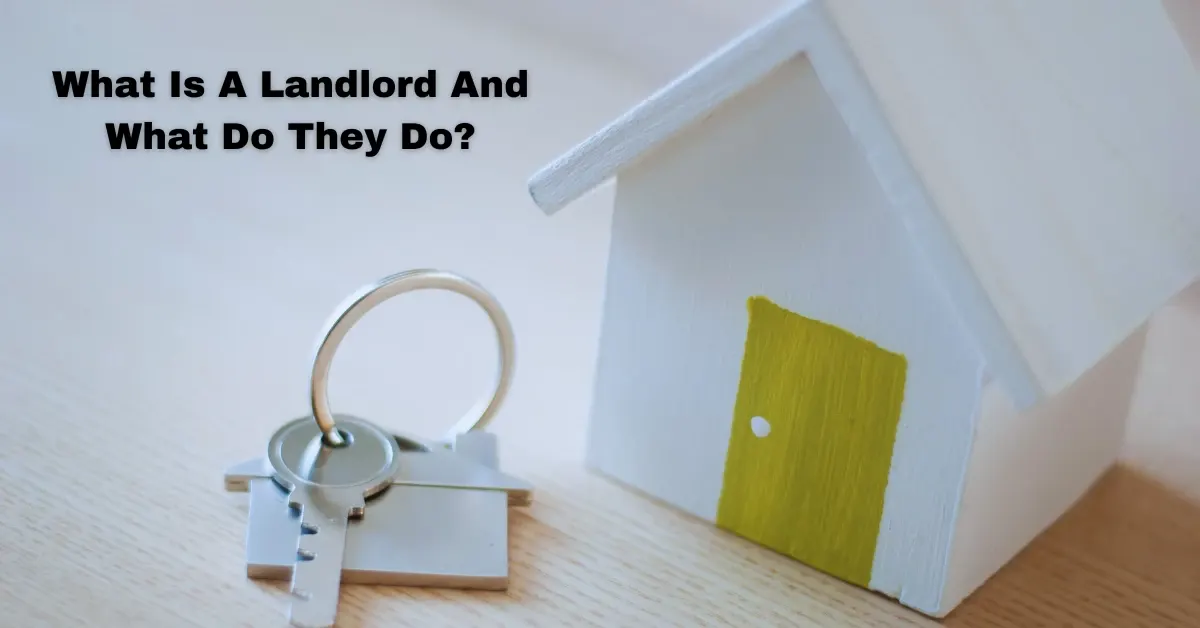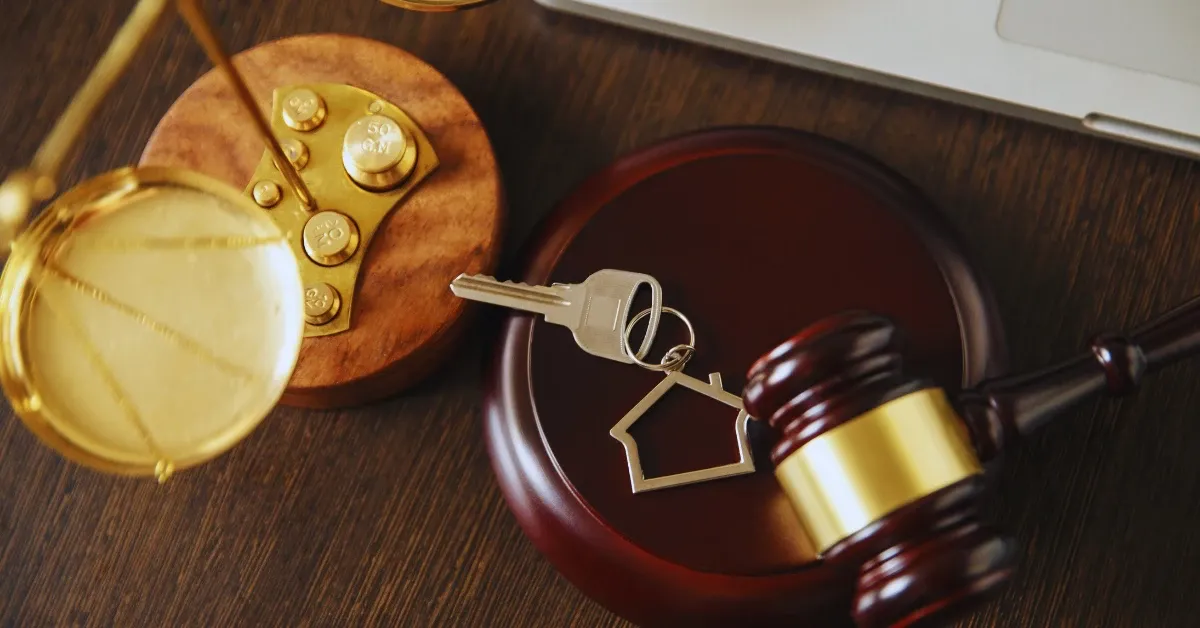A landlord is responsible for managing a rental property and overseeing tenant relations, including rent collection, maintenance and repairs, and complying with legal requirements.
As a landlord, your main responsibility is to manage and maintain your rental property and ensure the tenants have a safe, comfortable, and habitable living environment.
This involves collecting rent, responding to maintenance and repair requests, and maintaining the property to a certain standard.
You must also comply with all legal requirements, including local and state tenant-landlord laws and fair housing laws.
Good communication with tenants is key to a successful landlord-tenant relationship, resolving concerns and issues with open and honest dialogue.

What Is A Landlord And What Do They Do?

Definition Of A Landlord
A landlord is an individual or company that owns a property and rents it out to tenants in exchange for a payment, typically monthly rent.
Being a landlord involves a lot more than just collecting rent checks.
The Landlord’S Responsibilities
As a landlord, you have a long list of responsibilities, which include the following:
- Advertising and showing the property to potential tenants.
- Screening potential tenants to ensure they are a good fit for the property.
- Writing and signing lease agreements and ensuring tenants follow the lease terms.
- Collecting rent payments and late fees as necessary.
- Maintaining the property in excellent condition, including necessary repairs and regular maintenance.
- Handling tenant complaints and concerns in a timely and professional manner.
- Enforcing evictions, if necessary.
Essential Traits Of A Good Landlord
Being a landlord can be a challenging job, but there are several essential traits that make a good landlord, which include:
- Strong communication skills, including the ability to listen and respond to tenant concerns.
- Attention to detail and strong organisational skills.
- Patience and a willingness to work with people from diverse backgrounds.
- A business-oriented mindset and the ability to manage finances effectively.
- Flexibility and the ability to handle challenges that arise unexpectedly.
Common Misconceptions Regarding Landlords
There are several common misconceptions surrounding landlords, including the following:
- Landlords are just in it for the money and don’t care about their tenants.
- Landlords have the right to enter their tenants’ apartments at any time without prior notice.
- Landlords can refuse to make necessary repairs to a property if they don’t feel like it.
- All landlords are wealthy and don’t need rental income from their properties.
Legal Obligations Of A Landlord

Understanding The Landlord’S Legal Duties
Being a landlord can be a lucrative and fulfilling experience, but it comes with legal obligations and responsibilities that must be fulfilled.
If you’re a landlord, it’s essential to understand your legal duties to avoid any legal issues, breaches of contract, or potential legal battles with your tenants.
Here are some of the critical legal duties of a landlord.
Laws That Govern Landlord-Tenant Relationships
Several state and federal laws govern the relationship between landlords and tenants.
As a landlord, you must be well-versed in these laws to avoid any legal issues and protect your property and assets.
Here are some of the most crucial laws that regulate landlord-tenant relationships.
- Fair housing act.
- Americans with disabilities act (ADA).
- Landlord and Tenant Act.
Tenant Rights And Landlord Obligations
As a landlord, it’s your responsibility to provide a safe and habitable living environment for your tenants.
You must ensure that your property complies with any applicable housing codes, building maintenance and safety standards, and health laws.
Here are some of the tenant rights and landlord obligations that you should be aware of.
- Providing a safe and clean living environment.
- Maintaining the property in good condition.
- Responding to repair requests in a timely manner.
- Respecting tenants’ privacy.
- Giving proper notice before entering a tenant’s apartment or home.
The Importance Of A Lease Agreement
A lease agreement is a legally binding contract that outlines the terms of the landlord-tenant relationship.
It includes the rent amount, payment due date, lease term, and security deposit.
It’s vital to have a well-drafted lease agreement to avoid any legal disputes and protect your interests as a landlord.
Here are some of the essential elements of a lease agreement.
- Names of the landlord and tenant.
- The length of the lease term.
- The amount of rent and payment due dates.
- The security deposit amount.
- Procedures for handling repairs and maintenance requests.
Typical Challenges Faced By Landlords
Owning property and becoming a landlord can seem like a lucrative investment; however, there are many obstacles that landlords face on a daily basis.
If you’re thinking of becoming a landlord or are currently in the industry, it’s essential to be aware of the potential difficulties that can arise.
Here are some of the most common challenges that landlords encounter:
Potential Difficulties When Choosing Tenants
Choosing the right tenants can be challenging and stressful for landlords, as rental income depends on reliable and trustworthy tenants.
Here are some potential obstacles landlords could face when selecting tenants:
- Screening tenants and their applications thoroughly to ensure they can pay rent on time and do not have a history of causing damage to rental properties.
- Discrimination lawsuits, which could result from selecting tenants based on their race, gender, religion, or other protected characteristics.
- Legal obligations, such as verifying tenants’ identities and their legal right to reside in the country, can be time-consuming and challenging.
Potential Ongoing Maintenance Issues
Maintaining and repairing a rental property is part of a landlord’s ongoing duties. Here are some potential ongoing maintenance issues that landlords may face:
- Regular wear and tear, such as plumbing leaks, electrical issues, or roofing problems, which could cause significant damage if left unaddressed.
- Tenants may not report maintenance issues in a timely manner. This could lead to even greater repairs or damage to the rental property.
- High repair costs and disruptions to tenants’ everyday lives could adversely impact the landlord’s reputation and relationship with tenants.
Dealing With Tenant Requests And Complaints
Tenants may have requests or complaints about the rental property, which can be challenging for landlords. Here are some potential issues:
- Landlords may receive multiple requests or complaints simultaneously, making it tough to prioritize them and respond quickly.
- Inadequate communication or misunderstandings between landlords and tenants could lead to escalated disagreements and legal complications.
- Strained relationships with tenants could lead to negative reviews online or damage to the landlord’s reputation.
Security Issues And Liability Concerns
Ensuring tenant safety and avoiding potential legal troubles is another challenge that landlords face.
Here are some potential security issues and liability concerns that landlords must be aware of:
- Providing adequate security measures, such as door locks, smoke detectors, and outdoor lighting, can be costly and time-consuming.
- Additional security requirements could affect the landlord’s ability to charge reasonable rent, such as in the case of mandatory sprinkler systems or fire escape routes.
- Landlords can be held accountable for tenants’ injuries or damages caused by tenants’ negligence if they fail to implement appropriate safety measures.
Communication Skills For Effective Landlord-Tenant Relations
Importance Of Clear Communication With Tenants
Effective communication is the key to a healthy landlord-tenant relationship.
It’s important to establish clear communication right from the beginning to avoid misunderstandings and disputes.
Here are some reasons why clear communication is crucial:
- It helps tenants feel more comfortable when they can easily reach out to their landlords with issues or concerns.
- It ensures that tenants understand the lease agreement and expectations of the landlord, reducing the risk of confusion.
- It helps landlords receive feedback and suggestions from tenants, which can improve their overall experience.
Methods For Maintaining Good Communication
Now that we understand the importance of clear communication, we can take a look at some methods landlords can use to maintain good communication with their tenants:
- Regularly checking in with tenants to see if there are any issues that need to be addressed.
- Responding to tenant inquiries in a prompt and efficient manner.
- Using different forms of communication, such as email, text messaging, or phone calls, to meet the tenants’ needs.
- Having a clear and open-door policy, where tenants feel comfortable reaching out to their landlord for anything.
- Establishing clear protocols for maintenance requests, emergencies, and rental payments.
How To Address Conflict And Disputes Effectively
Even with the best communication and intentions, disputes can still arise between landlords and tenants.
As a landlord, it’s crucial to have a strategy for dealing with conflicts in a timely and effective manner. Here are some tips to address conflict and disputes effectively:
- Listen actively to understand the tenant’s perspective and avoid interrupting or being dismissive.
- Work collaboratively with the tenant to find a mutually agreeable solution.
- Document all communication related to the conflict for future reference.
- Be proactive in addressing the conflict and avoid letting it escalate.
- Consider getting a neutral third party involved if necessary, such as a mediator or arbitration service.
Basic Financial And Business Management Skills

Financial Management For Landlords
As a landlord, it is essential to manage your finances well to ensure profitability and sustainability.
Effective financial management involves keeping accurate records, budgeting, and forecasting expenses and revenue. Here are some tips:
- Keep track of all income and expenses associated with your rental property in a separate account. This account will make it easier for you to manage and monitor your finances.
- Create a budget and stick to it. Set aside money for regular expenses, such as insurance, property taxes, maintenance, and repairs.
- Forecast future costs to make better financial decisions. For instance, if your property requires regular maintenance, it is best to factor that into your budget.
Rent Collection Techniques
Rent collection is a crucial aspect of being a landlord. Here are some tips to ensure smooth rent collection:
- Establish clear rent payment policies and communicate them to tenants before they move in.
- Use a rental payment system that is easy and convenient for both you and your tenants.
- Follow up promptly on late payments. A regular and clear follow-up process will help increase the likelihood of on-time payments.
Accounting For Expenses And Profits
Accurate accounting is vital to keeping track of your rental business’s cash flow and profitability. Here are some accounting tips for landlords:
- Keep track of all expenses associated with your rental unit, including repairs and maintenance.
- Use accounting software or hire an accountant to manage your property’s finances.
- Regularly review your finances to determine your rental profits or losses. This information will enable you to make informed decisions about your rental unit.
Property Management And Maintenance
Maintaining your rental property is critical to getting and keeping good tenants.
Regular maintenance ensures that your property remains in good condition, saving you money in the long run.
Here are some tips for managing and maintaining your rental property:
- Create a maintenance schedule and stick to it. Regular maintenance will help you identify issues early and save on repair costs.
- Respond promptly to tenant maintenance requests.
- Hire a qualified property management company or professionals to handle complex repairs or maintenance tasks.
As a landlord, mastering basic financial and business management skills is critical for long-term success.
Follow the above tips to make sure that your rental business remains profitable and sustainable.
Legal And Regulatory Knowledge
Understanding Local And Federal Landlord Laws
Being a landlord is not just about owning a property and leasing it to tenants.
It also involves knowledge of local and federal landlord laws that you must comply with to avoid any legal liability.
Here are some key points to understand when it comes to landlord laws:
- Research and familiarize yourself with the local and federal landlord-tenant laws to avoid any legal problems in the future.
- Ensure that your rental agreements comply with the law and do not contain any illegal or unfair terms.
- Follow the landlord-tenant laws when terminating a lease, increasing rent, or evicting a tenant. Failure to comply with the law can lead to lawsuits and penalties.
- Keep updated on changes in the laws to ensure that you’re still in compliance.
Tenant Screening Guidelines And Discrimination Laws
Tenant screening is essential to ensure that you choose the right tenant for your rental property.
However, it’s important to follow the tenant screening guidelines and anti-discrimination laws to avoid any legal claims.
- Create a written set of tenant screening criteria that applies to all applicants to avoid any discrimination.
- Check the tenant’s rental history, credit score, and income to assess their financial stability and ability to pay rent.
- Conduct a background check or criminal history investigation, but ensure that it complies with the law, and that you have written consent from the applicant.
- Avoid asking about protected personal information like race, gender, religion, and family status.
Handling Tenant Evictions
Evicting tenants can be a challenging and stressful process, but it’s sometimes necessary to protect your property and business interests.
Here are some key points to keep in mind when handling tenant evictions:
- Always comply with the tenant eviction process outlined in your rental agreement, and follow the landlord-tenant laws in your area.
- Give ample notice to your tenant before starting the eviction process and provide them with a reason for eviction.
- Keep detailed records of all communication and actions taken during the eviction process to protect yourself from any legal claims.
- Hire a lawyer to ensure that you are complying with the law throughout the eviction process.
Overview Of Fair Housing Regulations
As a landlord, you must comply with fair housing regulations, which aim to prevent discrimination against protected classes. Here’s an overview of what you need to know:
- The fair housing act prohibits discrimination against protected classes, such as race, religion, gender, national origin, family status, and disability.
- Ensure that your tenant screening criteria do not discriminate against any protected class.
- Avoid making any discriminatory statements or actions towards your tenants or prospective tenants.
- Make sure that your property is accessible to tenants with disabilities and make reasonable accommodations to enable them to enjoy the full use of the property.
Attracting And Retaining Good Tenants
Advertising And Marketing Rental Properties Effectively
When it comes to attracting good tenants, there are a few key things landlords can do to advertise and market their rental properties effectively.
Some strategies to consider include:
- Creating a compelling online listing that includes professional photos of the property and highlights its best features.
- Posting the listing on multiple websites and platforms to increase visibility.
- Utilizing social media to promote the listing and reach a wider audience.
- Holding an open house or virtual tour to give potential tenants an opportunity to see the property firsthand.
Pre-Screening Potential Tenants Effectively
On the road to retaining good tenants, pre-screening potential tenants effectively is an important step.
Landlords should aim to find tenants who are reliable, responsible, and trustworthy.
Here are some tips for pre-screening potential tenants:
- Requesting a rental application that includes information about the tenant’s employment, income, and rental history.
- Performing background and credit checks to identify any red flags.
- Contacting the tenant’s references to confirm their reliability and responsibility.
Creating A Welcoming Atmosphere For Tenants
Creating a welcoming atmosphere for tenants is key to retaining good tenants. Tenants who feel valued and respected are more likely to stay for the long term.
Some things landlords can do to create a welcoming atmosphere include:
- Responding promptly to tenant inquiries and concerns.
- Making necessary repairs and upgrades in a timely manner.
- Offering amenities and perks that enhance the tenant experience, such as free wifi or access to a fitness centre.
- Hosting community events or activities to foster a sense of community among tenants.
Keeping Tenants Satisfied And Improving Tenant Retention
Finally, keeping tenants satisfied and improving tenant retention is the ultimate goal for landlords.
Some strategies to consider include:
- Offering lease renewal incentives to encourage tenants to stay for another term.
- Providing regular communication about property updates or changes.
- Addressing any tenant concerns or complaints promptly.
- Maintaining positive relationships with tenants by showing appreciation for their tenancy.
Staying Ahead Of Maintenance And Safety Concerns
Being a landlord comes with many responsibilities, and one of the most significant is keeping your property safe and maintained.
Ensuring that everything is in order not only makes your tenants’ lives easier but can also save you money in the long run.
Here are some tips for staying ahead of maintenance and safety concerns.
Tips For Preventative Maintenance
Preventative maintenance is all about performing routine checks and fixes to stop any potential issues before they become significant problems.
Here are some tips to help you stay ahead of preventative maintenance:
Keep a schedule
Set up a regular maintenance schedule to ensure you don’t miss any critical checks.
Check for leaks
Regularly check for leaks, both inside and outside the house, to prevent water damage and mold.
Inspect HVAC systems
Inspect your HVAC systems regularly to make sure they’re working correctly, and replace filters as needed.
Keep appliances in good working order
Check on appliances, like the fridge, stove, and washer/dryer, regularly and replace or repair them as needed.
Establishing Safety Protocols And Guidelines
Keeping your tenants safe is a top priority. Establishing safety protocols and guidelines can help make sure everyone knows what to do in case of an emergency.
Here are some guidelines to consider:
- Install smoke detectors: Ensure that working smoke detectors are installed in every room and check them regularly.
- Have clear evacuation procedures: Create and post evacuation procedures, so everyone knows what to do in case of a fire or other emergency.
- Conduct regular safety inspections: Schedule regular inspections of the property to ensure it’s up to code and address any safety concerns immediately.
- Keep emergency numbers handy: Post emergency numbers, including the fire department, police, and ambulance, in an easily accessible location.
Strategies For Addressing Maintenance Requests In A Timely Manner
No matter how proactive you are, maintenance requests are inevitable.
Responding to requests in a timely manner can help build trust with your tenants and prevent small issues from turning into significant problems.
Here are some strategies for addressing maintenance requests promptly:
- Create a system for tracking requests: Keep a log of maintenance requests, including the date and time they were received, and the date they were resolved.
- Communicate with tenants: Always keep tenants in the loop and provide regular updates on when you plan to address their requests.
- Prioritize requests: Address urgent requests first, like a burst pipe or electrical issue, and then move on to less pressing matters.
- Hire reliable professionals: Ensure that any contractors or repair professionals you hire are reliable and experienced in their field.
Frequently Asked Questions For What Does A Landlord Do
What Is The Role Of A Landlord?
A landlord manages their properties, collects rent, and maintains the upkeep of the property.
Can A Landlord Enter Without Permission?
A landlord must provide notice and receive consent before entering a rented property.
What Happens If Rent Is Not Paid?
If rent is not paid, a landlord may take legal action, including eviction and court proceedings.
Are Landlords Responsible For Repairs?
Landlords are responsible for repairing any issues with the property that pose a safety risk or affect tenants’ health.
Conclusion
You don’t just sit back and collect rent as a landlord; it’s much more involved. You’re the linchpin in property maintenance, balancing legalities, and building tenant relationships.
Embrace the variety and challenges, because being a landlord isn’t a sideline – it’s a business.
Reference
https://www.mass.gov/guides/landlord-responsibilities
